The Rising Popularity of Pet Birds: Trends and Insights
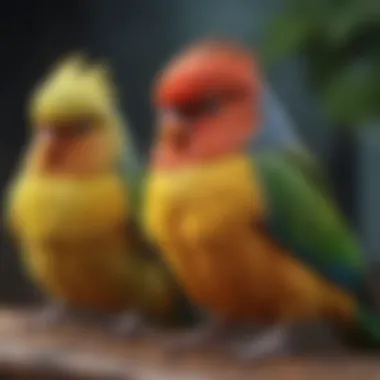
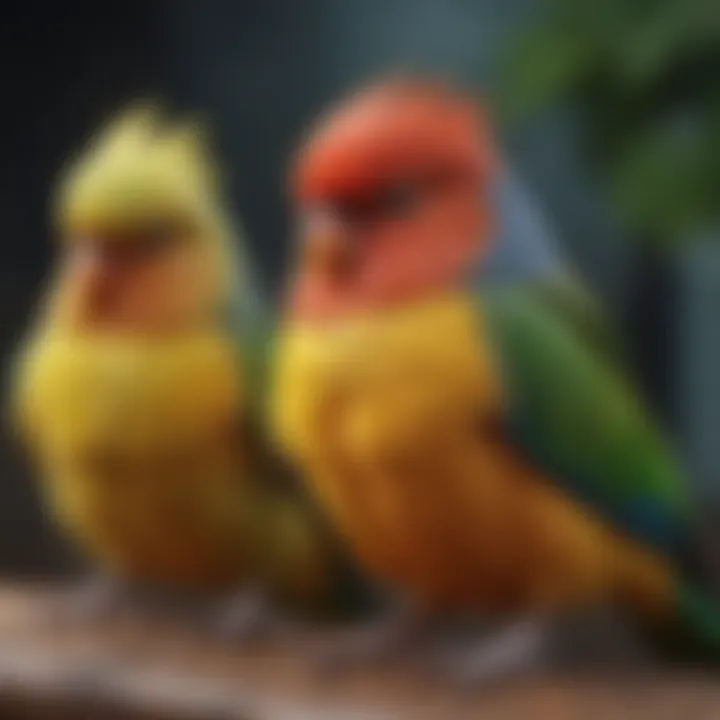
Intro
The dynamic world of pet ownership is evolving consistently, and the surge in popularity of pet birds signifies a pivotal shift in companion animals. Unlike familiar pets such as dogs and cats, birds offer unique qualities and insights into the nature of companionship. This article descibes various factors driving the fascination with avian companionship, along with crucial ownership responsibilities.
Understanding the demographic trends is essential when discussing pet birds. Mixing culture and convenience influences the choice of specific bird species among various owners. Additionally, the analysis will delve into the critical nuances of how to care for these animals for their welfare. An operation chord runs throughout this article: while birds entertain their owners, maintaining their health and well-being is paramount.
By addressing the essential components like care routines, behavioral insights, nutrition needs, health practices, and room for enrichment, this piece will draw a complete landscape of owning a pet bird. Together, we will observe how emotional benefits are intertwined with responsible pet management.
Care Tips
Owning a pet bird involves understanding a proper set of care practices. Here are some key points considering daily requirements.
Daily Care Routines
Caring for pet birds primarily revolves around routine. Establish a schedule that looks like this:
- Feeding: Provide fresh food and water every day. Fresh fruits, vegetables, and high-quality pellets form the basis of their diet.
- Social Time: Birds are social creatures. Planning dedicated time to interact and bond with them is significant for their emotional needs.
- Monitoring: Observe their behaviors closely for any unusual activity. Notice whether they seem lethargic or are engaging with their surroundings.
Cage Setup and Maintenance
Creating an ideal habitat begins with the cage selection. Factors to consider:
- Size: Choose a spacious cage that offers enough room for their movement.
- Configuration: Incorporate perches, swings, and natural wood branches to encourage movement.
- Location: Keep cages in areas that allow the birds to feel part of the household while ensuring they’re away from direct drafts and sunlight.
- Maintenance: Clean the cage regularly to prevent diseases. Change bedding and toys intermittently to maintain a hygienic environment.
Hygiene and Cleaning Practices
Hygiene is often overlooked but is essential for bird health. Important measures include:
- Daily Checks: Remove old food and soiled bedding.
- Deep Clean: Regular airy cleanliness for the cage using safe cleaning supplies. Ensure any chemical residues are thoroughly removed afterward.
- Fresh Water: Maintaining clean water containers is crucial, replaced daily ensures this quality.
Seasonal Care Adjustments
As seasons shift, adapt care accordingly. Monitor humidity and temperature in their living spaces and make necessary adjustments. Provide necessary warmth during colder months without overheating.
Behavioral Insights
Understanding avian behavior positively impacts the relationship between bird and owner. Learning the intricacies can be beneficial for coexistence.
Understanding Bird Body Language
Birds communicate vastly through body language. Pay close attention to several signals like:
- Fluffed Feathers: Indicates comfort or stress depending on context.
- Wing Position: Wide-open wings often indicate readiness for flight or a threat.
Common Behavioral Issues and Solutions
If behavioral issues, like excessive screeching or biting, develop, try the following approaches:
- Source Assessment: Analyze when and why specific behaviors occur. Stress could arise from environmental adjustments.
- Behavior Tutorials: Engage birds through specific techniques, modeling positive behaviors.
Positive Reinforcement Techniques
Rewarding good behaviors balances training. A mild treat or affectionate speak reinforces positive habits with efficacy.
Social Interaction Needs
Birds thrive in interaction. Offer playdates with other birds if possible and integrate human companionship as needed for stability.
Nutrition Guides
Proper nutrition is a keystone of bird welfare. Here's a guide:
Essential Diet Components
Quality pellets should base diet alongside safe fruits and vegetables like:
- Carrots
- Leafy greens
- Apples (without seeds)
Safe and Toxic Foods
Learn about potential threats. Toxic foods include: chocolate, avocado, and caffeine, which can extremely harm birds.
Supplements and Treats
Integrate supplements inline with specific needs. Some require calcium or omega-3 additions per species recommendations accordingly.
Feeding Strategies for Different Species
Different bird species have different requirements. Consult pet documentation to habitually base bird diets around specific needs. Learn about favorite foods per type and incorporate accordingly.
Wellness and Health
Bird health is another large section of ownership duties, and its management may look somewhat like this.
Routine Health Checkups
Plan for yearly checkups with avian specialists; keeping preventative measures habits protects against diseases, paramount for bird owners.
Identifying Symptoms of Illness
Awareness is key in bird care. Business as usual relatively make discerning ill signals, crucial implications. Signs include fluffiness, lethargy, or erratic plucking behaviors that signal distress or illness.
Preventative Care and Vaccinations
Vaccination may address diseases common in specific species. Ensure consult with avian vets on proper vaccination protocols that might align with disese patterns in certain areas.
Mental and Emotional Well-Being
Emotional health requires consistent observation of signs for stress and/or activity; offer stimulation and companionship to fulfill their social needs dynamically.
Enriching Activities
Most birds thrive with activities; these can promote proper well-being. Vital areas focus on maintaining interaction.
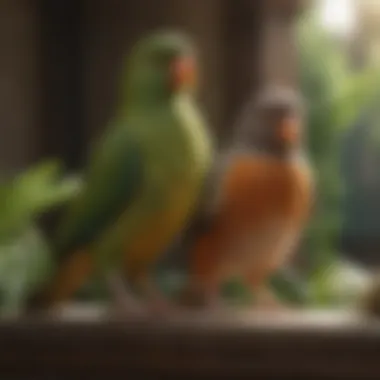
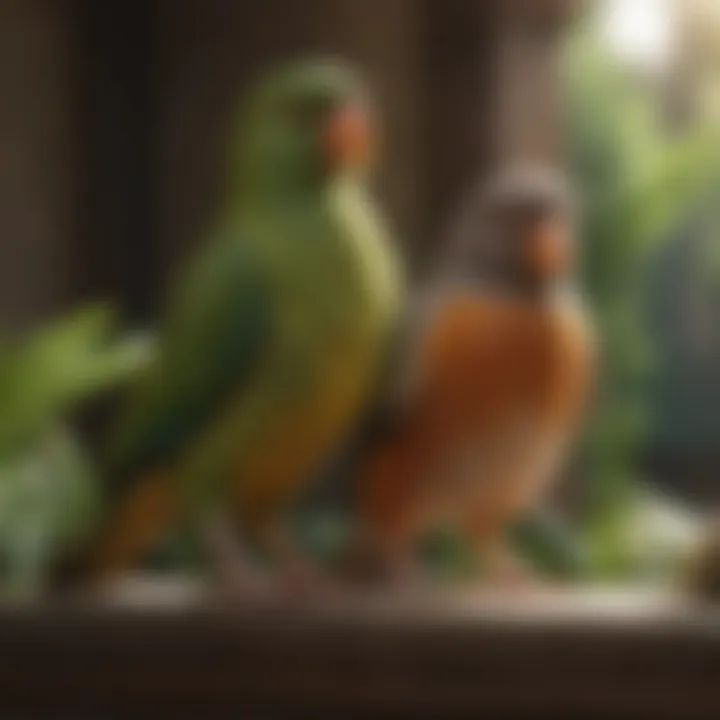
Toys and Playtime Ideas
Selecting appropriate toys stimulates the minds of pet birds. Offer varied equipment, both chew-friendly and those enriching curiosity.
Training and Tricks
Engaging them in training routines entertains mindsets positively. Use short sessions to teach side-tips steadily.
Outdoor Activities and Interaction
Supervised outdoor time enlivens spirits. Watch for sensitivities to loud noises or environmental causes like dogs or vehicles present nearby.
DIY Projects for Mental Stimulation
Fulfilling crafts and DIY creations with approved materials can stim JV-human and bird interactions fervently ripe bonds deepening further.
Thoughts to Ponder: Building a secure environment implies the responsibility for their welfare while you bond grants executive freedoms within limits availing a fortunate relationship - cultivating a loving paradigm whoever lives in the humble pet realm will no doubt bestow the responsibility solely relevant inner circles.
Prologue to Pet Birds
The topic of pet birds is gaining considerable prominence today. Birds are recognized not just as beautiful creatures but also as cipherial companions that fulfill various emotional and social needs for their owners. This piece will dissect the rising tide of avian companionship, lending perspective to why more individuals are inclining toward them with each passing year.
Understanding the connection between humans and birds requires numerous angles to consider. Factors such as lifestyle compatibility, the basic psychological benefits, and the aesthetic appeal of these creatures are crucial components. Moreover, potential owners should be aware of the unique responsibilities and care considerations involved. Failing to understand these aspects can lead to issues for both parties. Unlike cats or dogs, pet birds come with specific care demands.
Importantly, this growing trend isn’t merely about birds themselves; it signifies deeper human needs and societal shifts in perception around ownership. With pet birds, many feel a sense of companionship without the often significant demands associated with larger pets. Therefore, how pet birds fit into our lives deserves thorough consideration.
"The companionship of birds enrich prime moments in life, helping fill spaces that only they, through their song and presence, can truly fill."
Historical Context of Birdkeeping
Understanding the historical context of birdkeeping is essential in recognizing how the relationship between humans and birds has developed over time. The practice of keeping birds as pets dates back thousands of years. Ancient civilizations estimated that birds’ unique qualities, such as their colors and sounds, contributed to their relevance. This section explores how birdkeeping transformed from a mere fascination with nature to a modern lifestyle choice for many individuals.
The Evolution of Birdkeeping Practices
Birdkeeping has undergone significant evolution across eras and regions. Initially, the objective was centered on aesthetics; people simply enjoyed observing birds in their natural environments. Over time, birdkeeping evolved into more structured practices.
During the Roman Empire, for instance, wealthy individuals began keeping cage birds prominently in their homes. Singers like the canary became symbols of status. The function shifted also to include breeding behaviors, as collectors often sought the most vibrant and best-singing specimens.
In Europe, during the Renaissance era, there was a rise in interest in birdkeeping for both companionship and entertainment. The emergence of specialized avian care books in the 18th century standardized methods for keeping pet birds. It improved care techniques and initiated cultivation of specific bird species for households.
Today, assorted breeding practices combine modern knowledge with such historical traditions. Quakers and African grey parrots are common examples of birds now bred for pets, illustrating how history influences current practices.
Cultural Significance of Birds in Society
Birds have long played multifaceted roles within various cultures worldwide. They symbolize freedom, loyalty, and beauty. In many societies, birds are regarded as spiritual messengers. For example, Native American traditions attach birds to supernatural narratives and healing practices.
In Europe, literature and art frequently reflect the societal belief in birds as messengers or bearers of hope. Such perceptions underpin the unique bond humans share with pet birds today.
“Birds have often been enveloped in myths and lore, which are technical precursors to genuinely bonding with them in personal ownership.”
Pet bird ownership has now become ingrained in modern culture beyond traditional symbolism. Connectivity through technology helps to create communities. Platforms such as Reddit and Facebook offer resources for pet bird owners. They enable individuals to educate themselves and share experiences with other passionate members, connecting the past cultural significance with today's trends in ownership. This evolving narrative not only influences the popularity of birds but also highlights substantial considerations in their care and companionship.”
In summary, the historical context behind birdkeeping is fundamental. It offers insights into human desires and expectations of avian relationships. With an admirable depth and diversity, the practices associated with caring for birds emphasize that pet ownership nowadays may reflect both historical evolution and modern sensibilities.
Demographics of Pet Bird Owners
Understanding the demographics of pet bird owners provides valuable insights into not just who cares for these animals, but why they choose them over traditional pets. This section highlights patterns related to age, gender, and geographic distribution among bird owners. These aspects are essential for capturing the shifting landscape of avian companionship, revealing preferences that can inform breeders, retailers, and NGOs about marketing and support strategies. Owning a pet bird requires commitment, and this characteristic attracts specific demographic groups, leading to potential further study and understanding in enhancing service offerings for them.
Age and Gender Trends
Research indicates distinct age and gender trends in pet bird ownership. Compared to other pets, birds attract a diverse group of owners. Among them, many pet birds come home with individuals in their young adult years, particularly those between ages 18 and 35. This alignment with younger demographics may stem from a lifestyle that favors compact living situations. Birds generally require less space than larger pets like dogs or cats.
Exploring gender trends, studies suggest that female ownership tends to be slightly higher than that of males. However, the involvement of males, particularly in aviaries or purchasing exotic birds, also persists strongly. The differences in ownership motivations vary; men often lean towards larger species like parrots, while women may prefer smaller, more docile birds like finches. Understanding these dynamics is useful for businesses that want to connect pertinent products and services with the right audience. Overall, knowing this demographic picture allows for refined marketing strategies and community engagement specific to bird owners.
Geographic Distribution of Owners
Geographic location significantly influences bird ownership demographics. The necessity is more persistent in urban regions where pets must adjust to smaller living spaces and where companionship is essential for mental well-being. Areas with easy access to agriculture often correlate with a traditional inclination toward birds.
Some statistics exhibit denser bird ownership in major cities like New York City, where various species thrive effectively in confined living arrangements. Natural habitat influences ownership trends as well, with tropical and warm-arid areas frequently home to species commonly isolated from cooler climates. This geographic aspect provides insights regarding supply considerations and the balance between local availability and importation of bird species.
Inherent in these demographics lies the necessity for awareness regarding best practices for bird care and ownership responsibilities, underscoring the need for emphasis on locality and practicality in attracting a responsible pet bird community.
Factors Influencing Ownership
Understanding why people choose to own pet birds enhances our grasp of their growing popularity. This section aims to explore critical influences that guide potential owners in making such a decision.
Lifestyle Compatibility
The lifestyle of an individual plays a key role in deciding to own a pet bird. Birds require specific care, including time for interaction, maintenance of their environment, and feeding them nutritious food. Some species need more engagement than others. For instance, parrots demand significant social interaction and mental stimulation. Conversely, budgerigars can be more independent. Many aspiring bird owners consider these factors carefully.
People often argue about the advantage of birds over traditional pets like dogs and cats. Birds need less space and can live happy lives in smaller environments. This translates well for city dwellers or individuals with limited living arrangements. Their behavior sometimes makes them suitable for people with active lifestyles, as their needs can sometimes align with that of busy schedules.
Additionally, pet birds bring companionship while not requiring long walks or specific outdoor activities. The presence of birds as pets often enhances life quality without demanding extensive lifestyle changes.
Psychological Benefits
The psychological effects of owning a pet bird can be profound. These birds offer emotional support and companionship that help alleviate feelings of loneliness and stress. Engaging with birds, whether through training or simply enjoying their presence, can lead to enhanced mental health. Many studies have shown that owning pets contributes positively to mental well-being.
Research indicates several benefits, including:
- Reduction of Stress Levels: Bird owners often report lower stress after interacting with their pets. Their comforting chirps and colorful displays can significantly uplift mood.
- Enhanced Focus and Productivity: Tasks like training birds or cleaning their cages force owners to engage with these activities, which can serve as a break from daily routines. This interaction gives a sense of accomplishment and purpose.
- Companionship and Connection: Birds are social creatures. Their affectionate behavior leads many owners to feel connected and less isolated. Creating bonds through routines benefits both birds and owners alike.
Aesthetic Appeal and Companionship
Birds are recognized not only for their companionship but alsο for their visual appeal. The vibrant colors and unique tribes found in species like macaws or canaries capture attention. Their appearance can be a powerful draw for many people. Nesting a bird in one’s home adds an aesthetic value. Cages decorated stylishly allow owners to express their personal tastes.
Birds present personality traits that evolve as they develop. Their variety in temperament and appearance plays a considerable role in attraction. For instance:
- Playful species, like cockatiels, exhibit behaviors that enchant their owners and contribute to a lively atmosphere at home.
- Quirky traits harness the art of companionship, with many birds exhibiting behavior that incites laughter or joy through sheer spontaneity.
Additionally, many bird enthusiasts appreciate not only the companionship but also the ability to engage in mutual interaction solidifies their bonds with avian kinds. Owners tend to cherish their pets’ individuality, delighting in unique names and traits known only to them.
Birds do not only offer companionship, their beauty contributes to the home environment, making them cherished parts of life.
Popular Avian Species as Pets


Pet birds occupy a unique niche in the companionship spectrum. From their lively personalities to their melodic voices, the diverse types of avian companions have specific traits that resonate with different kinds of pet owners. Understanding the popular species of pet birds can help aspiring owners make informed choices. This section sheds light on several avian species and considers their unique characteristics, benefits, and the responsibilities associated with their care.
Parrots: The Charismatic Companions
Parrots are among the most favored pet birds, known for their intelligence and sociable nature. Their ability to mimic human speech is alluring, drawing people towards them as companions. Parrots come in various species—like the African Grey, Amazon, and Budgerigar—each having distinct features and care needs.
Benefits of Parrot Ownership
- Social Interaction: Parrots thrive on human interaction. Their engaging behaviors often create strong bonds with their owners.
- Mental Stimulation: Keeping a parrot involves providing various enrichment activities, which can be beneficial for both the bird and the owner.
- Longevity: Many parrot species have long lifespans, giving pet owners the prospect of a lifelong companionship.
However, the responsibilities are significant. Parrots need large cages, a varied diet, and daily socialization to remain happy. Additionally, their vocal nature may not suit every household.
Canaries and Finches: The Melodious Selections
Canaries and finches are another class of birds that captivate many. Known primarily for their singing, these small birds can bring a pleasant ambiance into any home. Canaries have a sweet melody, while finches are often energetic and social in groups.
Care Considerations
Canaries: These birds typically require individual space, so housing them alone can promote better health. Their diet needs to be high in protein, with fruits and vegetables for a balanced intake.
Finches: These are social creatures and do best when kept in pairs or small groups. Their habitat should be spacious enough to accommodate their flying needs, as they are active fliers.
Doves and Pigeons: The Subtle Companions
Often overlooked in the pet bird realm, doves and pigeons offer quiet companionship. Doves possess a calm demeanor while pigeons can exhibit playful behaviors. Both species bond closely with owners when well-socialized from an early age.
Unique Traits and Considerations
- Peaceful Nature: Doves are resilient and can adapt to various environments, making them suitable for quieter households.
- Social Structures: Pigeons can thrive in a social environment, showing affection to their companions.
In sum, doves and pigeons can provide sought-after company that contrasts sharply with the more boisterous species like parrots.
“Choosing the right bird can depend on personal preferences, culture, and lifestyles. Understanding specific attributes of these popular species is essential for prospective bird owners.”
Care Considerations for Pet Birds
Caring for pet birds goes beyond simple feeding and providing shelter. It encompasses various critical factors that ensure the health and happiness of these avian companions. Understanding care considerations for pet birds is necessary not only for potential owners but also for those who wish to deepen their existing knowledge.
Nutritional Needs
Proper nutrition is foundational to bird health. Birds require a balanced diet that mirrors their natural feeding behavior as closely as possible. Every species has specific needs, so understanding what to feed pet birds is vital.
Seeds vs.
Pellets
While many owners rely on seed diets, they are generally deficient in crucial nutrients. Pellets can offer a more balanced nutritional profile. The key is to choose high-quality products tailored to one's bird species category.
Fresh Fruits and Vegetables
Including fresh fruits and vegetables supplements the diet with vitamins, minerals, and fiber. Common options include leafy greens, carrots, and bell peppers. It’s important to introduce new items gradually, as some birds may require time to adapt.
Importance of Water
Fresh and clean water must be available at all times. Many birds enjoy bathing, so including water bowls for this purpose encourages good hygiene and mental enrichment as they groom themselves.
Socialization and Interaction
Birds are inherently social creatures. They thrive on interaction and incorporated companionship, which is fundamental to avian welfare. Regular social engagement prevents behavioral issues such as screaming, excessive feather plucking, or other maladaptive actions.
Establishing Trust
New pet owners must develop trust with their feathered friends. This may require days or weeks of gentle interaction. Speaking softly and offering treats helps birds feel secure, forming a strong bond between bird and owner.
Enrichment Activities
A variety of interactive toys and social games encourage cognitive stimulation. This engagement helps reduce boredom and reinforces positive behaviors. Activities could include towing, free flight, or even mimicry prompts.
Housing and Environmental Enrichment
The living environment plays a critical role in avian well-being. A bird's habitat should provide adequate space where it can exercise and engage with its surroundings.
Cage Specifications
A suitable cage must be spacious enough for the bird to spread its wings and move freely. The width of the bar spacing should align with the bird's breed to prevent injuries. It's best to allow for horizontal space rather than solely vertical since many birds are prone to hanging in fast-accelerating surfaces.
Environmental Enrichment
Decorating the cage with durable toys, perches, and naturalistic materials like branches mimics a more natural setting which is crucial. Regular rotation of toys encourages engagement, keeping birds physically active and minimizing stress.
Key Reminders: Kick away complacency by routinely assessing and adjusting care measures to suit your bird's evolving needs.
These considerations form the framework for not only a recessive interplay of ownership but a duty of care toward unpredictable fellow tenants of your life. Addressing nutrition, enhancing social structures, and facilitating enviable habitats remains imperative for a fulfilling companionship with pet birds.
Challenges in Bird Ownership
When one decides to keep a bird as a pet, several challenges may arise. Understanding these challenges is crucial for current and aspiring bird owners. This section will delve into some of the most pressing concerns related to bird ownership, emphasizing behavioral issues, health concerns, and the mental health of birds. By addressing these aspects, owners can make informed decisions that lead to more responsible and fulfilling bird-keeping experiences.
Behavioral Issues
Birds communicate their emotions largely through behavior. Such behavior can range from beautiful songs to various unusual habits when they are stressed or anxious. This is vital to understand for every bird owner. Common issues include excessive squawking, feather plucking, and aggression.
Whether caused by environmental stressors, lack of attention, or poor socialization, these behavioral challenges need addressing. Here are some specific steps that can aid bird owners in correcting these matters:
- Enhance social interaction: Spend ample time with birds to reduce anxiety. Engage with them through play, talking, or training sessions.
- Environmental enrichment: Create a stimulating environment with toys, perches, and safe places for exploration. Variety can alleviate boredom, which often leads to behavioral issues.
- Training: Employ positive reinforcement methods to shape behaviors. Consistency is vital for success in this aspect.
By acknowledging behavioral challenges and taking proactive measures, owners can cultivate a healthier relationship with their birds. Keeping birds engaged often minimizes negative behaviors.
Health Concerns
Health concerns present a significant challenge pet bird owners must navigate. Birds often hide symptoms of illness until the situation becomes severe. This fact renders regular veterinary visits crucial, even for seemingly healthy birds.
Some common health concerns in pet birds include:
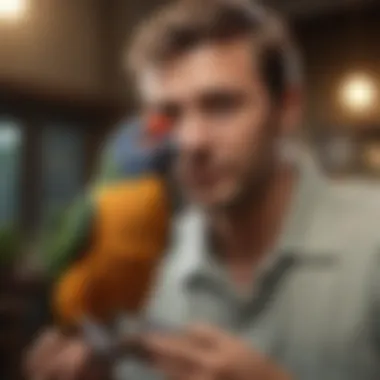
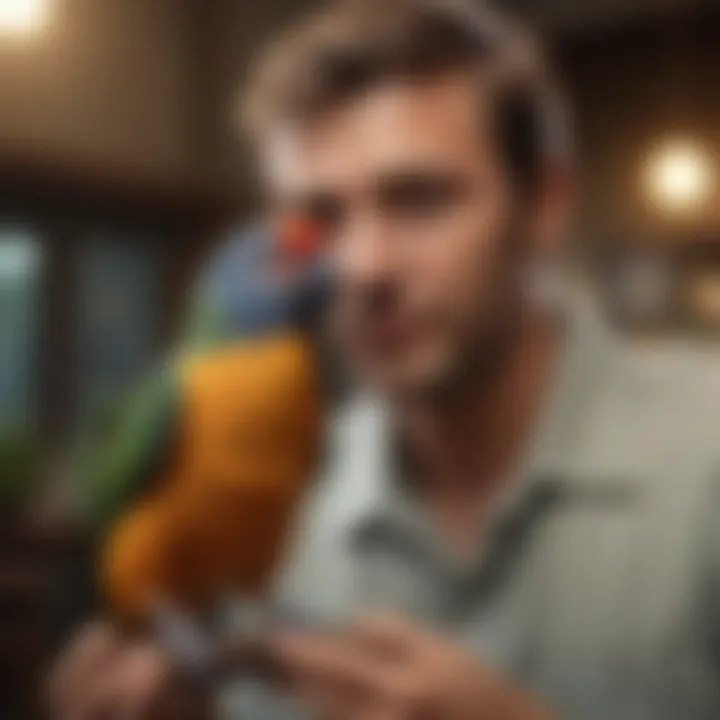
- Obesity: Many birds struggle with obesity due to an unbalanced diet. Proper nutrition focuses not just on seeds but also on vegetables and pellets specialized for birds.
- Diseases: Avian diseases such as psittacosis can be dangerous to both birds and humans. Early detection through routine health check-ups is vital.
- Environmental hazards: Exposure to harmful substances like smoke, toxins from cookware, or even certain houseplants can be fatal.
Pet owners need to be proactive about their birds' health. Educating oneself on avian biology and common behavioral signals of distress can also aid in maintaining their well-being.
Loneliness and Mental Health of Birds
Birds are social creatures. Keeping them alone for extended periods can lead to mental health issues akin to depression. Without proper social interaction, a bird may become withdrawn or agitated.
For this reason, adopting more than one bird can sometimes be beneficial. Birds of similar species often bond well, reducing loneliness. Here are some considerations for mental well-being:
- Social needs: Pairing birds similar in species helps. Budgerigars and canaries, for example, thrive in social settings.
- Routine interaction: Establish a routine that includes playtime, conversation, and bonding activities. This awareness prevents loneliness fostered by busy lifestyles.
- Behavior observation: Regularly observe behaviors for signs of loneliness. Sudden changes such as screaming, feather-plucking, or isolation can indicate distress.
Understanding these challenges allows bird owners to foster a more enriched, healthier life for their pets. Effective management of behavioral issues, health considerations, and mental well-being transforms bird ownership into a rewarding experience for both birds and their human companions, supporting a harmonious living environment.
Market Trends in Bird Products
The market trends in bird products are crucial for understanding the growing popularity and ownership of pet birds. This segment examines the increasing diversity of bird-related products, which reflect both the needs of bird owners and the specific requirements of various avian species.
Trends within this market stem from several factors:
- Evolving consumer preferences: As the demand for pet birds rises, owners are exploring a wide range of specialized products tailored for their birds.
- Welfare considerations: There is an increasing awareness of the welfare needs of birds, prompting sellers to offer products that enhance the living conditions and overall health of the birds.
- Innovation in product design: The development of innovative bird supplies, from nutritional feeds to engaging toys, shows the dynamic aspect of this industry.
Ultimately, understanding these trends allows consumers to make informed choices that optimize their pets’ well-being while satisfying their aesthetic and lifestyle preferences.
Growth of Avian Specialty Stores
In recent years, there has been significant growth in avian specialty stores, which are dedicated exclusively to bird owners. These stores fill the gap left by general pet shops and offer products primarily focused on the avian market.
Key Features of Avian Specialty Stores:
- Variety of products: They often stock an extensive range of species-specific necessities, such as varied diets tailored for different bird types.
- Expertise: Staff members usually have expertise in avian care, providing valuable advice to customers. This aspect is crucial for educating new bird owners.
- Community resources: Many avian stores foster a sense of community among bird enthusiasts, hosting events or workshops that support bird welfare and responsible ownership.
To conclude, these specific outlets enhance the bird-keeping experience, offering resources and merchandise phenomena unavailable in mixed-pet premises.
Online Shopping for Bird Supplies
The rise of online shopping for bird supplies mirrors broader retail trends, greatly expanding options for bird owners. Online retailers provide diverse selections that might not be feasible for local stores to stock.
Benefits of Online Shopping:
- Convenience: Owners can easily order essentials from their homes, saving time that might otherwise be spent searching in physical stores.
- Comparative pricing: The ability to compare prices and reviews helps consumers to make better purchasing decisions.
- Accessibility: For those in remote areas, online shopping ensures access to quality products that they might not find nearby.
However, owners may also need to consider shipping policies and return mechanisms, especially for delicate items like perches or special bird food.
Staying informed about the latest trends allows bird owners to make better choices that benefit both their pets and themselves.
In summary, the flourishing areas of avian specialty stores and online shopping for bird supplies significantly contribute to the pet bird ownership landscape. They do not only elevate the experience of caring for these animals but reinforce the commitment to their well-being.
The Role of Social Media
Social media has transformed how we share, connect, and engage with various interests, and pet birds are no exception. Platforms like Facebook, Instagram, and TikTok have created visibility for pet birds that far exceeds what was possible through traditional avenues. This section examines the pivotal role social media plays in bird ownership while emphasizing its multifaceted implications.
Influencer Impact on Ownership Trends
Avian influencers now dominate niches on platforms like Instagram. Their visually appealing posts on colorful birds yield substantial attention. These influencers are not just showcasing their pets but also sharing insights, tips on care, and personal stories about bird ownership.
- Creating Awareness: By sharing daily routines, feeding habits, or bonding moments, influencers disseminate critical information and raise awareness about species that prospective owners may not commonly consider.
- Normalizing Avian Care: Influencers contribute to normalizing the ownership of certain species, especially those considered less traditional, creating a ripple effect that inspires followers to consider birds as viable pets.
- Commercial Partnerships: Many influencers collaborate with brands offering bird care products. Their endorsements can influence purchasing decisions among their follower base.
While these trends enhance the popularity of pet birds, they must be balanced with responsible messaging about care, health, and welfare.
Online Communities for Bird Owners
The rise of online communities has played a significant role in nurturing a culture among bird owners. Social media platforms host numerous groups and forums dedicated to pet birds, providing spaces for dialogue, problem-solving, and resource sharing.
- Support Systems: Many members find immense value in these communities, especially first-time bird owners or those facing challenges. Sharing experiences often leads to collective learning that enhances the overall ownership experience.
- Resource Sharing: Users frequently exchange informational content about various species, product reviews, and veterinary recommendations. This peer-enhanced knowledge base encourages informed decision-making.
- Sustainability Initiatives: Some online spaces focus on rescuing birds in need. Owners discuss adoption, fostering, and rehabilitation, promoting a greater ethical approach to bird ownership. Online platforms offer a voice to conservation efforts while reducing undesired breeding in captivity.
Online communities cultivate relationships that bring together shared interests and responsibilities. Such engagement bridges the gap between enjoying pet ownership and maintaining ethical standards for the birds involved.
The role of social media in avian ownership is a double-edged sword—while it provides valuable resources and supportive networks, it also requires conscientious engagement about the responsibilities associated with keeping birds as pets.
Future Perspectives on Pet Bird Ownership
The future of pet bird ownership holds significant implications for both enthusiasts and the broader ecosystem of avian welfare. This section aims to elucidate the upcoming trends and implications that can affect current and prospective bird owners. Insights can guide experiences with these unique companions and foster a deeper understanding of conservation issues. As more people gravitate towards keeping birds, the effect on species preservation, ethical sourcing, and community engagement becomes increasingly critical.
Conservation Considerations
Conservation is a crucial element in the future of pet bird ownership. Many avian species face threats due to habitat loss, climate change, and illegal trade. When consumers choose to adopt certain species without awareness of their ecological impact, it can create pressure on wild populations. Therefore, responsible bird ownership must focus on conservation efforts.
Considerations for conservation include:
- Educating potential owners about endangered species and their needs
- Promoting the adoption of domesticated breeds over wild-caught birds
- Supporting organizations that rescue and rehabilitate birds
- Encouraging involvement in conservation projects that help protect native habitats
Collaborating with conservation initiatives enables bird owners to play an active role in safeguarding the well-being of avian species. By advocating for ethical practices in ownership, many bird enthusiasts contribute positively to bird preservation.
Predicted Growth in Avian Popularity
As societal trends continue to shift towards smaller living spaces, pet birds, with their compact size іand suitable companionship, are expected to witness exponential growth in popularity. Bird ownership reflects lifestyles favoring minimal upkeep amenities along with companionship. The increasing use of platforms like social media reinforces this trend, influencing individuals to seek insights from fellow bird owners about benefits and ownership responsibilities.
Key indicators of predicted growth include:
- Rise in digital content showing the joys of bird ownership
- Introduction of new, exotic avian species in pet markets
- Expanding availability of specialized products and services
- Heightened awareness of mental health benefits associated with interacting with birds
The confluence of these trends suggests an exciting era for pet bird lovers. Awareness regarding ethical implications of ownership develops amid a broader culture of inquiry about responsible practices. Owners stand at an important juncture that can foster environmental mindfulness alongside pet companionship.
Culmination
The examination of pet bird ownership culminates in a nuanced understanding of both its appeal and responsibilities. The rise in the popularity of pet birds is not merely a fleeting trend; it reflects a grander shift in human-animal relationships and the importance of companionship. Understanding the key elements discussed in this article provides insight into why individuals choose birds over other pets.
Benefits affecting ownership include:
- Companionship: Birds, known for their social behaviors, offer forms of companionship that resonate with many pet owners.
- Aesthetic Values: Their vibrant colors and diverse forms are captivating, elevating spaces they inhabit.
- Mental Health Benefits: Birds can positively impact mental well-being, often reducing feelings of loneliness and promoting a sense of purpose among owners.
However, the ownership of pet birds brings considerations that are fundamental to ensure their well-being. Importantly, potential owners must reflect on their lifestyle compatibility with the needs of birds. Unlike more traditional pets, birds require specific care, social interaction, and mental stimulation.
Moreover, ethical aspects cannot be overlooked. In acquiring pet birds, one must consider conservation and the welfare of wild populations. Thus, responsible ownership extends beyond personal enjoyment to encapsulate social and ecological mindfulness.
In the balance, enjoyment and responsibility emerge as solid foundations for nurturing these feathered companions. Interest in pet ownership steadily increases, but it becomes crucial that current and aspiring bird owners integrate knowledge, patience, and a commitment to care within their journey. Such an approach ensures not just the happiness of the birds, but enriching relationships that last a lifetime.
“Taking the time to truly understand the needs of our feathered companions enhances not only their lives but enriches our own.”
This article has examined pet bird ownership from multiple angles, offering a snapshot of trends, demographics, and social nuances. Armed with this understanding, individuals can indulge in informed pet ownership while fostering responsible enjoyment in their avian friendships.















